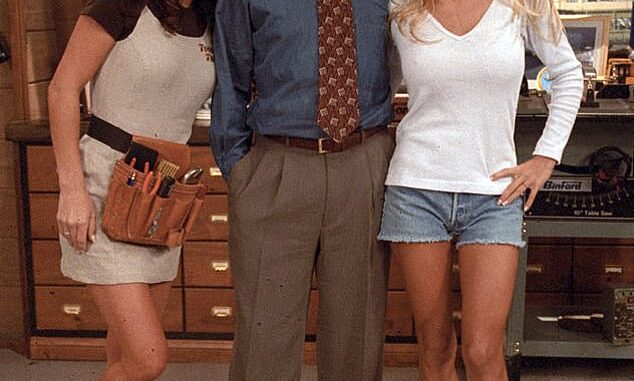
The Ghost in the Toolbelt: Pamela Anderson's Lisa, Then and Now, and the Lingering Effect of a Recast
Home Improvement, the iconic sitcom built around Tim Allen's grunting machismo and the domestic chaos it spawned, thrived on a comfortable predictability. Weekly doses of power tools, family squabbles, and sage advice dispensed from the unseen Wilson were the recipe for ratings gold. Yet, even within this familiar framework, change, however subtle, could ripple through the narrative landscape. The recasting of Lisa, the Tool Time girl originally played by Pamela Anderson, remains a fascinating case study in television history, highlighting the delicate balance between character recognition, actor appeal, and the enduring power of a role, however fleeting.
Back in the early 90s, Pamela Anderson was on the cusp of becoming a cultural phenomenon. Her role as Lisa, the demure yet undeniably attractive assistant to Tim Taylor on Tool Time, was a stepping stone, a precursor to the red swimsuit and slow-motion runs of Baywatch fame. As Lisa, Anderson exuded a quiet charm, often the straight man to Tim's boisterous antics. Her presence was primarily aesthetic, adding a touch of glamour to the otherwise male-dominated world of power tools and engine revving. While not a deeply developed character, Lisa was a consistent presence, a familiar face that contributed to the show's overall atmosphere. She represented a certain brand of idealized femininity – supportive, beautiful, and largely defined by her relationship to the male protagonist.
Then came the opportunity that would catapult Anderson to superstardom. Baywatch beckoned, and with it, the potential to redefine herself as a confident, empowered woman, albeit one still firmly situated within the male gaze. The producers of Home Improvement faced a dilemma: retain the established character of Lisa or embrace a new face, potentially injecting fresh energy into the role. They chose the latter, replacing Anderson with April, played by Debbe Dunning.
April, while fulfilling a similar function as the Tool Time girl, presented a subtly different persona. She was arguably more assertive, more openly engaging with Tim's jokes and shenanigans. Dunning brought a playful energy to the role, creating a character that felt less like a decorative accessory and more like a participant in the comedic chaos. While some viewers missed Anderson's quiet allure, others welcomed the change, finding April to be a more engaging and dynamic presence on screen. This shift, while seemingly minor, reflected a subtle evolution in societal expectations. The '90s were a time of increasing visibility for women in media, and April's character subtly mirrored this trend, representing a slightly more proactive and independent female figure.
Looking back now, the impact of this recasting is complex. Anderson's brief stint as Lisa has been largely overshadowed by her subsequent successes. While she will always be remembered as CJ Parker, the image of her in a Tool Time t-shirt remains a nostalgic artifact, a glimpse into the early days of a cultural icon. Dunning, on the other hand, carved out her own niche on Home Improvement, becoming a beloved figure in her own right. For many viewers, April is the definitive Tool Time girl, her name and face inextricably linked to the show's legacy.
Ultimately, the story of Lisa's replacement on Home Improvement serves as a microcosm of the dynamics at play within the entertainment industry. It highlights the fleeting nature of fame, the impact of casting choices on character development, and the way in which television can reflect (and sometimes influence) evolving social norms. The ghost of Pamela Anderson, the original Lisa, may still linger in the memory of some viewers, but the character of April, embodied by Debbe Dunning, has successfully filled the void, proving that even within the seemingly rigid confines of a sitcom, change, however subtle, can leave a lasting mark. The story of Lisa is not just about two actresses playing the same role, but about the shifting sands of celebrity, the power of reinvention, and the enduring appeal of a good, old-fashioned sitcom. It reminds us that even the most familiar formulas can be subtly altered, leaving behind a fascinating ripple effect that continues to resonate even decades later.